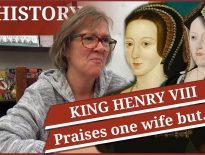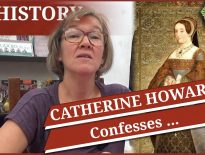On this day in 1485, just over two months after King Henry VII's forces had defeated those of King Richard III at the Battle of Bosworth Field, Henry VII's first parliament attainted Richard and his supporters.
Here is an account from Rapahel Holinshed's chronicle. I have altered some of the spelling to make it easier to read:
"For the establishing of all things, as well touching the preservation of his own estate, as the commendable administration of justice and preferment of the common wealth of his realme, he called his high court of parliament at Westminster the seventh day of November, wherein was attainted Richard late duke of Gloucester, calling and naming himself by usurpation, king Richard the third.
Likewise there was attainted as chief aiders and assistants to him in the battle at Bosworth, advanced against the present king, John late duke of Norfolk, Thomas earle of Surrey, Francis Lovell knight viscount Lovell, Walter Devereux knight late lord Ferrers, john lord Zouch, Robert Harrington, Richard Charleton, Richard Ratcliffe, William Berkeley of Welley, Robert Middleton, James Harrington, Robert Brakenbury, Thomas Pilkington, Walter Hopton, William Catesbie, Roger Wake, William Sapcote of the county of Huntingdon, Humphrey Stafford, William Clerke of Wenlock, Geoffrey St Germain, Richard Watkins herald of arms, Richard Revell of Derbyshire, Thomas Pulter of the county of Kent, John Welsh otherwise called Hastings, John Kendall late secretary to the said Richard late duke of Gloucester, John Bucke, Andrew Rat, and William Brampton of Burford.
In which attainder neverthelesse there were diverse clauses and provisos for the benefit of their wives and other persons, that had or might claim any right, title, or interest lawfully unto any castles, manors, lordships, towns, townships, honours, lands, tenements, rents, services, fée farms, annuities, knights fees, advowsons, reversions, remainders, and other hereditaments; whereof the said persons attainted were possessed or seized to the uses of such other persons: with a special proviso also, that the said attainder should not be prejudicial to John Catesbie knight, Thomas Revell, and William Ashby esquires, in, of, & upon the manor of Kirkebie upon Wretheke [?] in the county of Leicester, nor in, of, and upon any other lands and tenements in Kirkebie aforesaid, Melton, Somerbie, Thropseghfield, and Godebie, which they had of the gift & feoffement of Thomas Davers, & John Lie. And further, notwithstanding this attainder, diverse of the said persons afterwards were not only by the king pardoned, but also restored to their lands and livings." (Holinshed, 1587 edition, Volume 6, p. 762 - read here)
In "Henry VII’s first parliament" on the History of Parliament website, Dr Hannes Kleineke, explains that the business of Henry VII's first Parliament "was naturally shaped by recent political events: the king’s tenuous title to the throne had to be fortified by parliamentary sanction, his supporters who had been attainted of treason under Edward IV and Richard III rehabilitated, the supporters of the dead Richard III attainted, and their possessions seized" and that in that "it was not very different from the Parliaments that had opened the reigns of Edward IV and Richard III in 1461 and 1484." Supporters had to be rewarded and enemies had to be punished.
You can read Dr Kleineke's article at https://thehistoryofparliament.wordpress.com/2013/05/29/henry-viis-first-parliament/
Here are some Henry VII resources for you:



Long live King Richard!
Pretty normal stuff. In this period, King’s came and went in battle and in England no King since Henry IV, himself a usurper, had passed the crown of England on to his legitimate son and heir, at least not without them losing it. Henry vi lost it, Edward V, judged to have no lawful right
no lawful right by Richard’s_Parliament, had lost it and now Richard had been betrayed and killed in battle. So Henry Tudor, recently crowned, held his opening Parliament and came out with the same stuff Richard had in the Summer of 1485. Henry’s supporters were considered traitors, so now Richard and his supporters, many of whom fell in battle, others on the run and still others undecided on allegiance and given the usual ultimations, goods confiscated and imprisoned. Henry also predated his reign to the 21st August, the day before Bosworth and so everyone fighting against him was a traitor. This is often seen as sinister but in fact this Act of Attainder only has 30 plus names, while originally he decreed many more people, but gave people time to make their peace, if they were alive. Francis Lovell was one who remained free and was wounded at Stoke Field in 1487 and then vanished into myth. He was believed to have made for his mother’s home Minster Lovell and died of his wounds but no information of his body existed. No real knowledge of his fate was made until the eighteenth century. In an underground room, suitable to hide in, at a desk, in a chair, pen in hand, a quill for writing, papers around him, the remains of a man in his prime were found. Speculation arose as to this being the remains of Francis Lovell. Two recent books go into this mystery in more details.